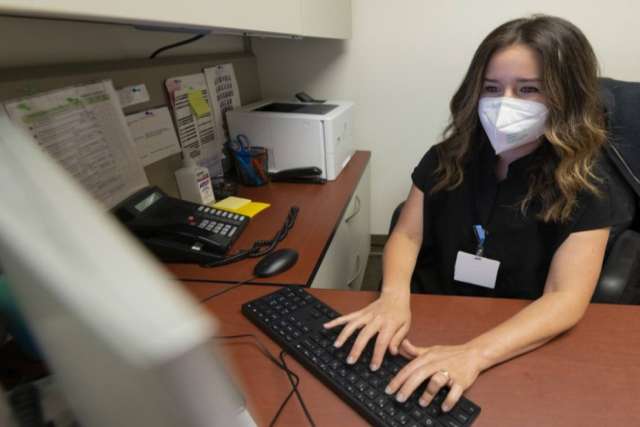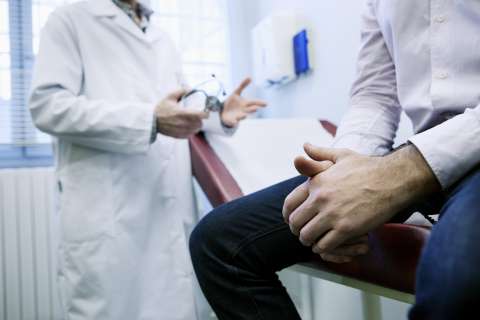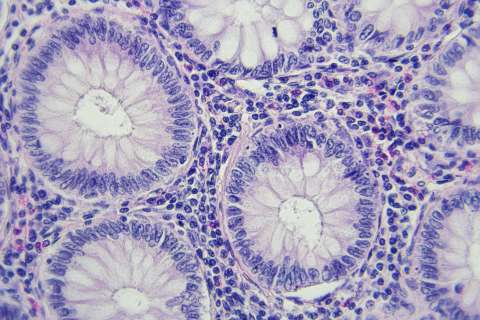Sometimes successfully treating a patient’s gynecologic cancer is just half of the battle.
A new program at UCLA Health is aimed at helping women continue that journey by healing physically, mentally and emotionally, as they move on to their best possible lives as cancer survivors.
Rachel Frankenthal, a physician assistant at UCLA Health’s Westwood and Santa Monica OBGYN Specialty Suite, had a vision that she and her colleagues could better help patients to heal their mind, body and spirit with a therapeutic program involving yoga, meditation and peer group support.
“These women go through so much, from the process of being diagnosed with cancer to months of treatment which can include surgery, chemotherapy, and radiation. These lifesaving therapies can unfortunately leave women with long-lasting side effects,” Frankenthal said. “I always felt that we had a responsibility to provide our patients with the resources and support to return to wellness.”
Before she studied to become a PA, Frankenthal was a professional dancer and certified yoga and Pilates instructor, so she was well aware of the value of mindful exercises.
“Movement and breath work provide so many therapeutic benefits so I knew it was essential to incorporate yoga into our survivorship program,” she said.
Starting this program last year, during the pandemic, Frankenthal designed and taught an eight-week bi-weekly virtual yoga program for a group of gynecologic cancer survivors. The participants immediately enjoyed the connection and camaraderie with other survivors, so Frankenthal then developed a virtual support group in collaboration with Madeline Elia, a clinical social worker with the Simms/Mann-UCLA Center for Integrative Oncology.
“Everything was being done virtually during the pandemic, which was actually very convenient since we didn’t have to worry about obtaining space for classes or other logistical issues such as transportation and parking for participants,” Frankenthal said.
The bottom line, of course, was how this program would help the patients.
“We surveyed the survivors before and after the pilot yoga program to see how it affected them, and we found that every single participant experienced an improvement in their treatment-related side effects, including fatigue, brain fog, mood and neuropathy,” Frankenthal said. “It also helped those with menopausal symptoms such as hot flashes and difficulty sleeping.”
Frankenthal and UCLA Health kept the program going after the conclusion of the pilot program, for free, due to its popularity with their cancer survivors.
Trauma recovery
Caitlin Musick, 33, is one of those survivors. She said she was surprised how much the program helped her recover from the traumatic process of treating her cervical cancer, which included chemotherapy and removal of her fallopian tubes.
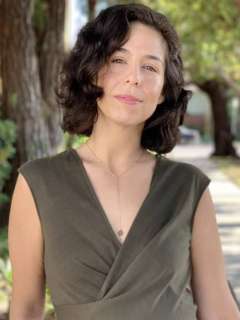
“To be honest, at first I was pretty resistant to doing therapy after they removed my cancer,” Musick said.
“I felt like, well, that happened, but it’s over now, and I just have to move on with my life,” she said. “But then feelings and emotions would come up after my treatment. Grief became a big factor, since it is doubtful that I can have children now. I didn’t really feel that while I was going through treatment because I was in warrior mode and busy fighting the cancer.”
Musick found that the feelings she had put on hold during her treatment came roaring to the surface, just when she thought she should have been feeling better.
“Wow, I did not know what to do with those feelings,” she said. “Thankfully, I joined the group, and they were just really helpful in helping me to process what I was going through.”
For Musick, with most of her family in the Chicago area, the sense of isolation going through her cancer treatment alone was offset by her therapy family at UCLA Health.
“I call it my Therapy Thursday, starting with the yoga class, then a few hours later we all get together online for our support group,” she said. “It is so helpful just to have some other women to talk to about the experience we are all going through.”
Shared experience
The group includes Mariam Usmani, who said the therapy really helped her regain her confidence after treatment for a 4-pound, 8-inch tumor in her uterus that ended up wrapped around her colon.
“The group has been so fantastic for me, I really don’t know how I would have gotten through all of this without it,” Usmani said.
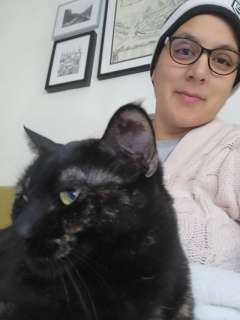
“It is so hard going through chemo, and you get really shaken by the experience,” she said. “I can say things in this group, and they just get it, because we’ve all gone through it, so we have this common ground that you just do not have with most other people.”
Frankenthal said this experience of isolation is common among most cancer patients, but it was increased dramatically by the pandemic.
“That was another reason it felt important to connect our survivors and create community for them. I wanted them to know that they were not alone,” she said. “It’s been very inspiring to witness these extraordinary women come together and support each other as they navigate moving through the world as cancer survivors.”
Cindy Stoltman of Long Beach found that to be true, even though she did not see herself as a “group person.” But after it was discovered she had uterine cancer she had a large tumor removed from her upper abdomen by Joshua G. Cohen, MD, a UCLA obstetrician and gynecologist, followed by four months of chemotherapy, she really enjoyed the yoga and therapy support through Simms-Mann.
“You’re never really prepared emotionally to hear the word ‘cancer’ from a doctor,” said Stoltman, 62, who went to the Emergency Department in March 2021 after she was “literally brought to my knees with sharp abdominal pain.”
“But they really took care of me all the way through my treatment. I was so impressed about how much all of the doctors and staff really cared about what I was going through and how I was feeling,” she said. “You can see and feel their passion and how they love what they do. They really do embrace the concept of strengthening your mind, body and spirit.”
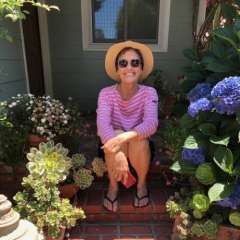
After successful surgery, Stoltman felt very confident going into chemotherapy with UCLA Health oncologist Dr. Arun S. Singh and Dr. Amy Cummings.
“In fact, I had two girlfriends who took turns taking me to chemo. But usually, there was one that would start crying and I would have to comfort her during the appointment,” Stoltman said with a laugh.
Stoltman said the support from other survivors in her UCLA Health group really helped calm her fears and apprehensions moving forward.
She said she was always into exercise, so she wasn’t sure she needed the physical therapy, but she was pleasantly surprised how much the yoga class with Frankenthal helped reduce her stress and worries.
“One really simple thing Rachael taught me is that when I have anxiety, I should take deep breaths and tell myself, ‘This is me breathing in, this is me breathing out,’ and it is just so surprising how much that helps to reduce my anxiety,” Stoltman said.
In the yoga group, Stoltman said she enjoys how different people with different backgrounds all add up to making the group stronger.
“Those women in the group, they are all so brave and strong,” she said. “I love that everybody has different strengths, so they give you a variety of support when you need it. With the whole program, you just feel like you have your own strong team behind you. I feel lucky to be a part of it. I will be eternally grateful to UCLA for my life and how I got past cancer.”
A source of empathy
Usmani said though she knew she was in for a tough experience with her treatment, there were unexpected difficulties along the way.
“You know, you are ready to lose your hair going through chemo, so you expect that,” she said. “But then you start seeing your eyebrows and eyelashes falling out. You start to lose your confidence. Then you have survivor guilt and even imposter syndrome, and you don’t know how to feel.”
Usmani found she wanted to talk about her experience with other women who shared her feelings.
“Being able to confide in the other survivors, and sharing empathy with each other, was just so comforting for me, and it was very instrumental in my transition to get back to work and back to life,” Usmani said.
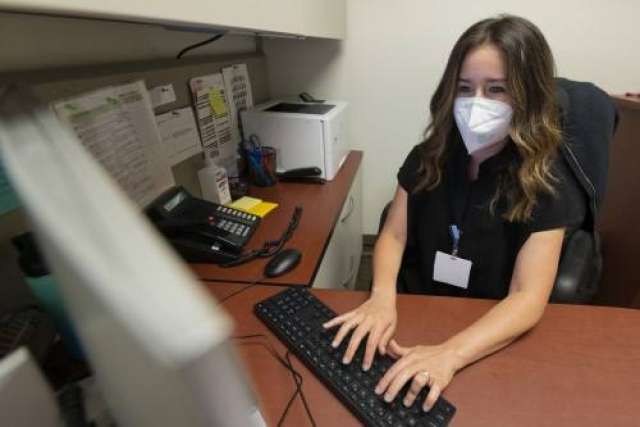
Frankenthal said that fulfills her dream for the program.
“It’s not enough just to treat the cancer,” she said.
“We want to support our patients through the transition between what can be a very intense and sometimes traumatic experience of treatment and the re-entrance into life that follows. Our program provides the space for women to reconnect with themselves as survivors, to find community with other survivors and to engage in therapeutic modalities to improve treatment-related side effects,” Frankenthal said, adding that other services for the survivors include acupuncture at UCLA’s Center for East/West Medicine, mental health support through the Simms/Mann center, diet and nutrition counseling and a menopausal symptom management clinic.
“Nobody wants to be diagnosed with cancer. However, with the right resources, I think coming out on the other side can be very empowering. We want our patients to go on to really live the lives they fought for,” she said. “That is our goal for survivorship.”
Learn more about the UCLA Gynecologic Oncology Survivorship Program.
Tina Daunt is the author of this article.
